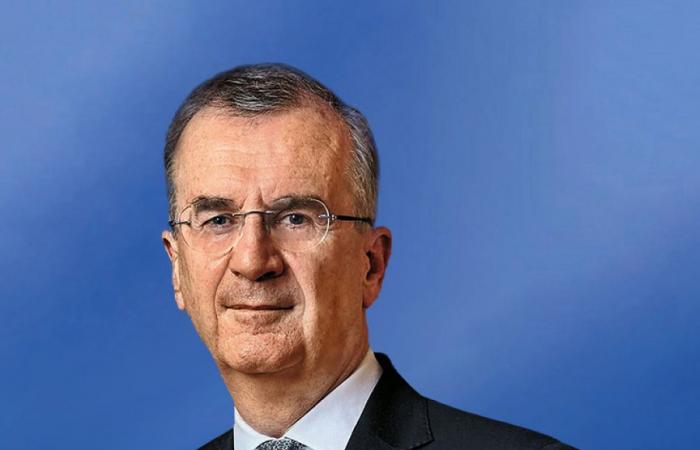Are we facing a slowdown in economic activity?
FRANCIS VILLEROY DE GALHAU : According to our recent field survey of 8,500 entrepreneurs, the right word is “resilience”. Our economy is currently in a slowing growth trend of around +0.2% per quarter, or around 1% per year. In the third quarter, there was a positive effect of the Olympics with 0.4% growth, and as a result, in the fourth quarter it will be less than usual. The economy is holding up but that doesn't mean it's enough. It's not a recession, but it's not yet the recovery we hoped for. The good news is the drop in inflation: it was more than 7% at the start of 2023, it has fallen significantly below 2%. This means that now, prices are growing less quickly than wages on average; this also allows interest rates to be lowered.
And about employment?
France has made great progress since the end of 2014, creating more than two million jobs. The unemployment rate has fallen from more than 10% to 7.4% today. Unemployment should however rise a little, probably between 7.5% and 8% before falling back towards 7%. During the previous economic downturn in 2012-2013, the unemployment rate exceeded 11%. This will not be the case in 2025.
Is full employment an unattainable goal?
We must stay on course for an unemployment rate of 5%. It's possible, several of our European neighbors are there. Given the slowdown, it will not be for 2027, but it is achievable within the decade.
As part of the 2025 finance bill, communities are seeing their budgets significantly cut. Could the effects in the territories not be deleterious for the economy?
Our country has been living beyond its means for too long. Today we have the highest deficit in Europe, with 6% of GDP, even more than Italy. Unlike our European neighbors, our public debt is not declining. It’s an anxiety-provoking situation: 80% of French people are worried. To remedy the situation, we need a fair effort shared by all. However, each sector tends to have savings ideas for others, but to refuse them for itself.
What expenses are you thinking about?
Our European social model is the right one, and I believe in it. The problem is that it costs us significantly more in France than our neighbors. We spend 9% of GDP more than them, or 260 billion euros per year. This efficiency gap concerns the State, but also certain social and local spending.
What does France risk if it cannot reduce the deficit to 5%?
Bringing the deficit down to 5% next year is the credibility threshold for France. Our interest rate difference with Germany (the “spread”) has increased significantly since June, from less than 0.5% to almost 0.8. The interest rates (for long-term loans) at which we borrow are now closer to those in Italy. This is a real alert. Today, France pays more than 50 billion euros in interest per year, already more than the Defense budget. From next year, we will pay more for the debt than for the Education budget.
Has France lost credibility because of its debt?
Our country risks having less weight in Europe because we have not respected our commitments for too long. We are then less respected ourselves, and less credible.
Are business failures accelerating?
We need to take a step back. In 2020-2021, there was a big drop in insolvencies at the time of Covid since there was extremely strong public support. Since then, we have observed a significant recovery, but its pace tends to slow down. Even if failures are not the only relevant economic indicator, we of course remain vigilant on individual situations.
How is company cash flow doing?
Entrepreneurs in the industry and commercial services sector report a certain feeling of deterioration in their cash flow. But when you look at the objective figures, cash flow is higher on average than before Covid. One of the explanations for this paradox is that companies had very abundant cash flow at the time of Covid, thanks to state-guaranteed loans (PGE). As these PGEs are repaid, which is normal, they tend to judge that their cash flow is deteriorating.
Can we hope that real estate rates will return to levels close to 1%?
Objectively, no: these 2020-2021 rates were absolutely exceptional. When you look at the average real estate rates for twenty years, it is more between 3 and 4%. We rose a little above 4% last year; today, we are back down to around 3.5%. For those who have real estate projects, it is a good time to go and test their bank and put it in competition with others, to have the best rates.
If the American Central Bank, the Fed, stops lowering its key rates, should we expect an alignment from the ECB?
The decisions we take at the ECB with Christine Lagarde are independent of those of the Fed. The proof is that we began to lower interest rates at the beginning of June and the Fed only lowered them three months later. With inflation falling, we will be able to continue lowering rates.
What effects could the American presidential election have on the European economy?
This result probably increases the risks for the global economy, and certainly the need for a European awakening. In the president-elect's program, there are significant elements of protectionism. This should mean more inflation in the United States and less growth everywhere. The increased budget deficit program also risks raising long-term rates (those from which states borrow, Editor's note). That said, our European economic destiny does not only depend on American policy but also on our choices.
In your opinion, Europe must take its destiny back into its own hands. What do you mean ?
For thirty years, Europe has had less innovation, productivity and growth than the United States. Either we continue this long sleep, which risks being amplified by American developments. Either we wake up, believing in our strengths. The first is our single European market which is as important as the American market. But it is much less attractive because it is divided, fragmented. According to the IMF, if we reduce obstacles within the single market by 10%, we could gain up to 7 points of growth.
How to finance the major transitions that Europe must face?
Thanks in particular to private savings, Europeans have a lot of them. Around 32,000 billion euros are saved in Europe. Two thirds of this amount are placed on interest rate products such as savings accounts. They are used to finance credits and debt. Only a third is invested in equity (that is to say to finance the capital of a company, Editor's note).
Are investments sufficiently directed towards Europe?
Every year, more than 300 billion euros of excess private savings are invested outside Europe. These sums go to the United States or emerging countries and finance their investment needs. In his report published in September on European competitiveness, former ECB President Mario Draghi recommends investing up to 800 billion for climate and energy, digital technology, and defense. By mobilizing this private savings, we will be able to finance a good part of these European investments.
How to successfully mobilize these savings?
Individuals will not invest directly. This will be done through financial intermediaries, funds, which pool and cushion risks. This is what needs to be developed through the Capital Markets Union, now called the Savings and Investment Union.
The question of company equity is essential. This is called innovation capital or venture capital. European companies do not generally lack bank credit, they lack equity.
That's to say ?
To take the risks of innovation, you must be financed with equity and shares. The investor then knows that there is a risk but also the prospect of gains if the innovation succeeds. This is the American model.
Today, as venture capital funds are more important in the United States, it happens too often that successful European companies are bought by these American funds, which in some way take over our startups with our money.
The Livret A rate is blocked until February 1, 2025. Could changes occur?
On Livret A, I will make my proposal to the Minister of Finance in mid-January. I just note that at 3% currently, Livret A savings are very well protected from inflation which is around 1.5%. Furthermore, the Popular Savings Account (LEP) intended for our poorest fellow citizens is even better protected, at 4%. Over the past two years, we have developed it significantly with nearly twelve million booklets. But 19 to 20 million French people could have an LEP.






